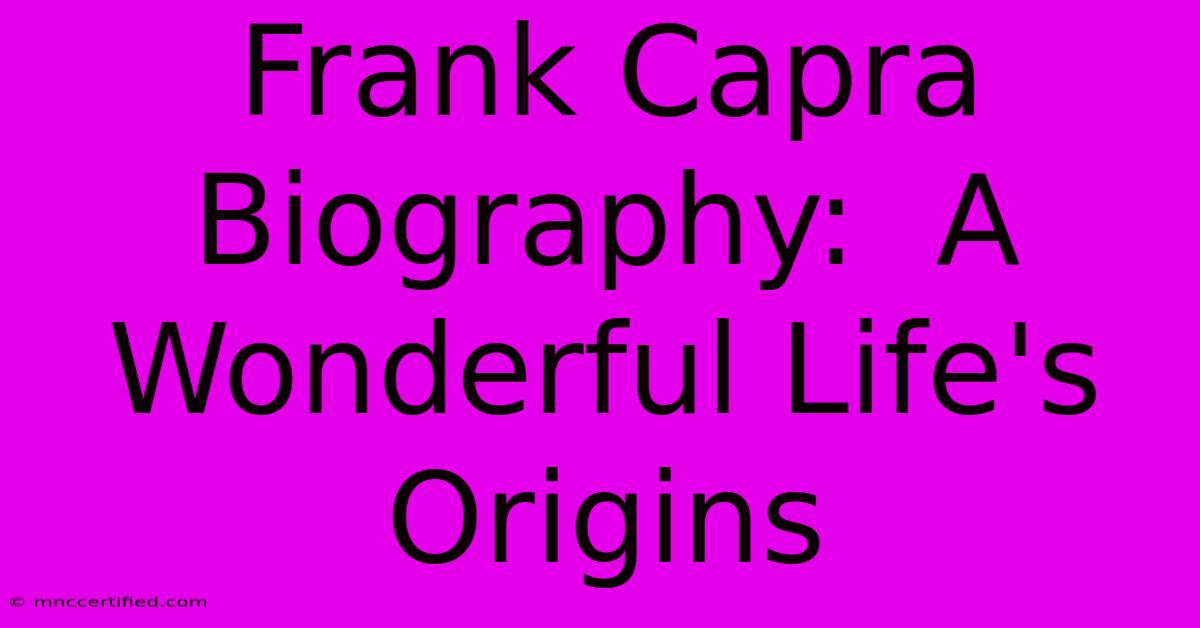Frank Capra Biography: A Wonderful Life's Origins

Table of Contents
Frank Capra Biography: A Wonderful Life's Origins
Frank Capra, a name synonymous with heartwarming Americana and feel-good cinema, remains a giant of Hollywood's Golden Age. His films, imbued with optimism and a deep-seated belief in the common man, continue to resonate with audiences worldwide. But few understand the life experiences that shaped his iconic directorial style, particularly the genesis of his most beloved film, It's a Wonderful Life. This biography delves into Capra's journey, exploring the events that profoundly influenced his masterpiece.
From Sicily to Hollywood: The Early Years
Born in 1897 in Bisacquino, Sicily, Frank Capra's early life was far from idyllic. His family emigrated to California when he was a child, experiencing the hardships of immigration firsthand. This firsthand encounter with poverty and the struggles of working-class families would later become a recurring theme in his films, shaping his empathetic portrayal of ordinary people overcoming adversity. He worked various odd jobs to support his family, developing a deep understanding of the challenges faced by everyday Americans. This period instilled in him a profound respect for the resilience and spirit of the common person—a sentiment powerfully reflected in It's a Wonderful Life.
The Rise of a Filmmaker
Capra's path to Hollywood wasn't straightforward. He initially pursued a career in engineering but his entrepreneurial spirit and keen eye for storytelling led him to filmmaking. He honed his skills through various roles in the industry, gradually climbing the ladder from a simple cameraman to a director. His early work showcased his burgeoning talent, though it wasn't until the 1930s that he found his signature style. He experimented with different genres, but it was his exploration of social commentary and his ability to blend humor and pathos that truly set him apart.
The Seeds of It's a Wonderful Life: Capra's Personal Struggles
While Capra's early life informed his storytelling, the genesis of It's a Wonderful Life can be traced to more specific experiences. During World War II, Capra served in the US Army Signal Corps, directing propaganda films that aimed to boost morale and rally support for the war effort. This experience profoundly impacted him, exposing him to both the heroism and the devastating realities of war. The film's themes of self-sacrifice, community, and the importance of human connection were arguably directly influenced by his wartime experiences.
The Impact of Philip Van Doren Stern's Story
The initial inspiration for It's a Wonderful Life came from a short story, "The Greatest Gift," written by Philip Van Doren Stern. This story, focusing on a man who contemplates suicide and is shown a glimpse of what the world would be like without him, served as the core premise for Capra's film. However, Capra significantly expanded on Stern's work, imbuing it with his own distinctive stylistic touches and the deep emotional resonance born from his life experiences.
The enduring Legacy of It's a Wonderful Life and Frank Capra's Impact
It's a Wonderful Life, released in 1946, initially faced lukewarm reception at the box office. Ironically, its failure at the time may have contributed to its later status as a cherished holiday classic. It's a timeless tale of hope, redemption, and the importance of community. Capra’s direction, along with the stellar performances of James Stewart and Donna Reed, helped cement the film's place in cinematic history.
The movie's continued popularity is a testament to Capra's enduring legacy and his ability to tap into universal human emotions. Its themes of overcoming adversity, appreciating the simple joys of life, and the power of human connection continue to resonate deeply with audiences across generations. Understanding Frank Capra’s biography – his humble beginnings, his experiences during wartime, and his artistic evolution – offers valuable insight into the creation of this cinematic masterpiece and underscores the powerful link between a director's life and his art. The film's enduring appeal is directly connected to the authenticity of its director's vision, fueled by a lifetime of unique experiences and profound observations of the human condition.

Thank you for visiting our website wich cover about Frank Capra Biography: A Wonderful Life's Origins. We hope the information provided has been useful to you. Feel free to contact us if you have any questions or need further assistance. See you next time and dont miss to bookmark.
Featured Posts
-
Mega Millions 1 7 M Win In Lemoore Ca
Dec 25, 2024
-
No Mega Millions Winner On Christmas Eve
Dec 25, 2024
-
Christmas Greetings From The Council
Dec 25, 2024
-
One Muppet Carol Scene That Stands Out
Dec 25, 2024
-
Yellowstone Stars Christmas Eve Movie
Dec 25, 2024